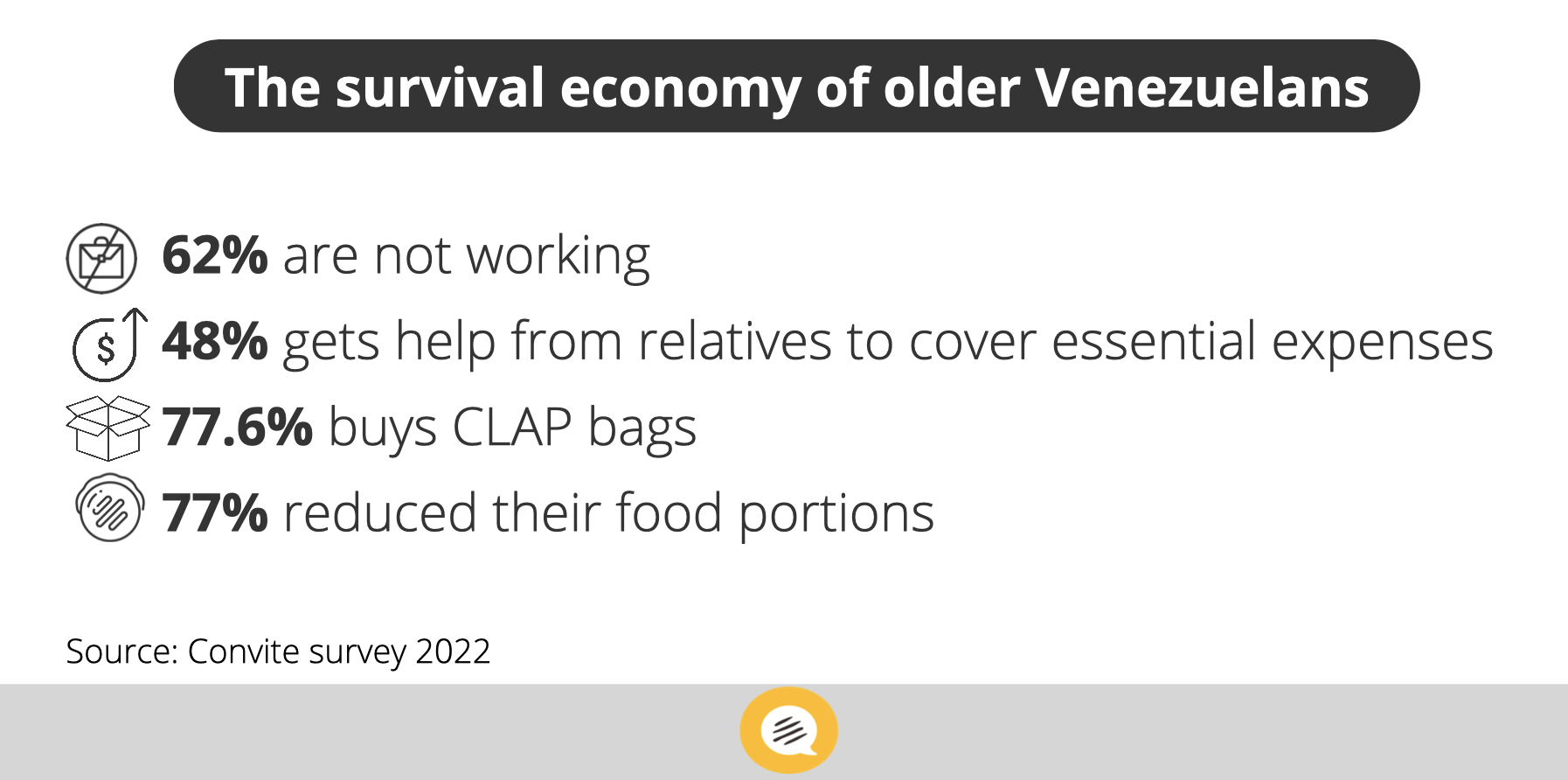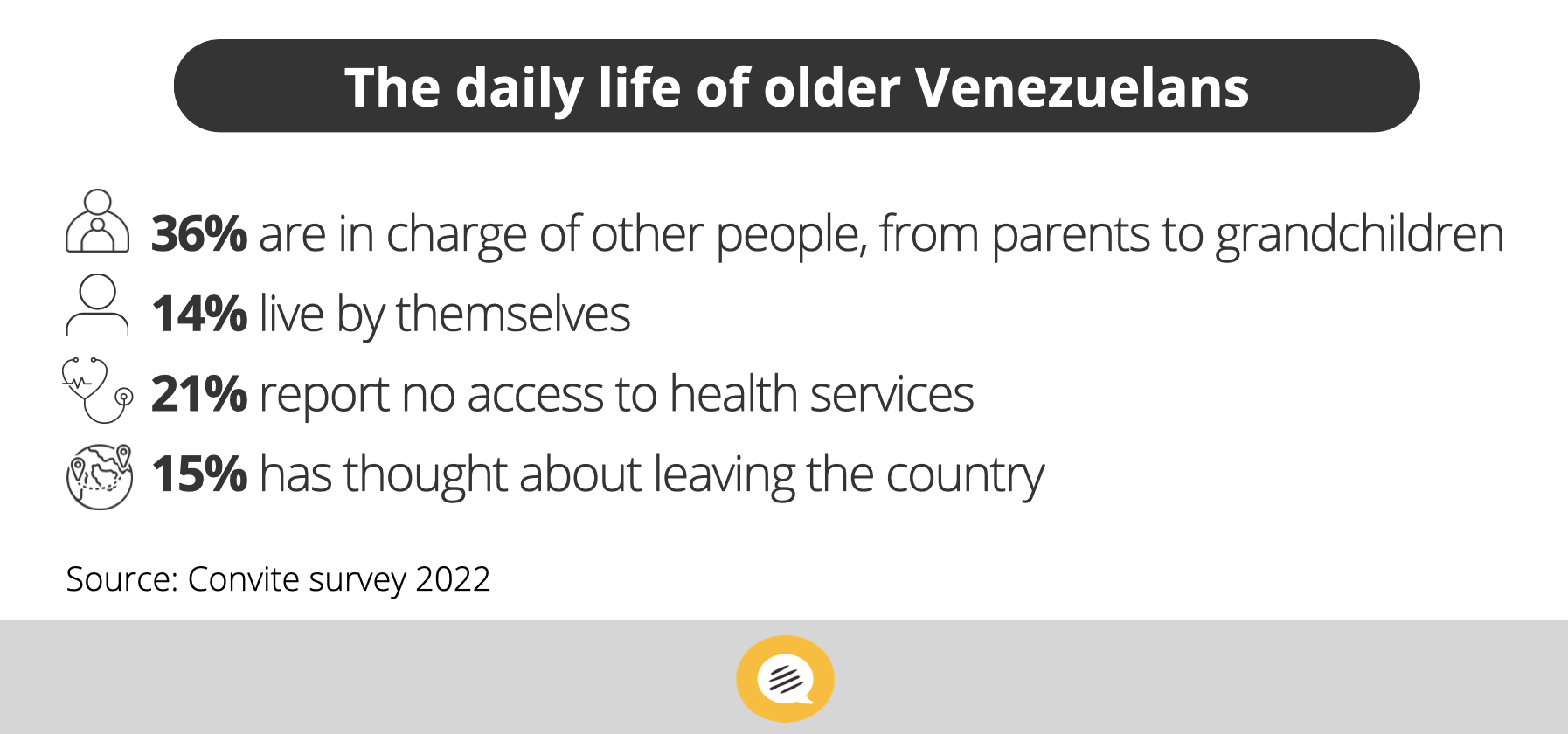Aging Venezuelans Need Empathy and Protection, Now
Older Venezuelans are particularly vulnerable to hunger, illness and the several types of violence that plague the country. Domestic and international actors must help to guarantee their rights.


As the UN Independent International Fact-Finding Mission on Venezuela, NGOs, and human rights activists continue to report evidence of crimes against humanity, Venezuela’s humanitarian crisis also earned a spotlight at the 77th Session of the UN General Assembly.
However, the specific situation of older Venezuelans deserves more attention, especially in light of the way that even higher-income countries have been called out for their neglect of older adults during the pandemic.
Leaders and experts looking to develop policies that foster a return to democracy in Venezuela will have to consider aging-related opportunities and concerns.
Below the Minimum Standard
One in six people around the world will be over age 65 by 2050. But, there is no single international definition of what it means to be an older adult. Entities including the United Nations and the World Health Organization have used benchmarks ranging from 50-65 years of age to define older populations, though country-specific markers of old age may differ based on life expectancy and social determinants of health. According to Venezuela’s Social Security Act, older men are those age 60-plus, and older women are those over 55.
To improve the lives of older individuals by enabling them to age with dignity and safety, the United Nations established the Decade of Healthy Ageing (2021-2030). This global initiative of United Nations stakeholders such as governments, civil society, academia, and the private sector established four primary action areas: Age-Friendly Environments, Combating Ageism, Integrated Care, and Long-Term Care. When we apply this framework to Venezuela, any efforts to create stronger support systems for older adults may require unique implementation methods. Nevertheless, in this country’s context, as in all others, investing in the well-being of older adults can also contribute to improving the well-being of other generations.
A 2022 survey by Convite, an NGO that promotes respect for older Venezuelans’ human rights, found that 90% of them endure regular electricity service interruptions; and 86% have faced inconsistencies in their water supply.
Furthermore, over a third of older Venezuelans act as caregivers for either a child, another older adult, or someone with a disability, meaning they are often responsible for both their own and their families’ or communities’ well-being.
Regarding medical care, over 90% of older Venezuelans do not have a health policy. More than half of Convite’s survey respondents also do not see a doctor regularly because of limited finances and restricted mobility. Even before the pandemic, a 2019 rapid needs assessment found that, for 75% of older survey respondents, their health centers didn’t have certain medicines available.
According to the Associated Press, one woman reported selling her sewing machines, a key source of potential future income, in order to pay for medical supplies for a cancer-removal surgery.
At the same time, 29% have been found to be living in homes that required major repairs. This year, the New Yorker even documented how professors and staff of a once star-studded university are paid salaries that leave them in poverty.
A well/known engineering professor was described as “malnourished, depressed, and dehydrated” when he was found on the floor of his home in the city of Merida, lying next to his wife who had died of a heart attack.
From Legislation to Reality
The conditions older Venezuelans currently face are unacceptable, not only from a human rights perspective but also in light of the country’s previous commitments to its older population. Article 80 of the Constitution outlines, “the State, with the joint participation of families and society, is obligated to respect [older adult’s] human dignity and autonomy and to guarantee them full care and social security benefits.” Article 86 adds that each person has the right to receive social security as an older adult. Additional protections and services are referenced in the Law on Violence Against Women and the Family, the Law on the Provision of Social Services to Older Adults and Other Categories of Persons, and the Law on Food and Medicine Bonuses for Pensioners and Retirees.
Even though some of the laws outlining the rights of older Venezuelans were created before the start of the current crisis, these commitments still apply and are not being adequately fulfilled. For instance, the government did raise the amount distributed as a monthly pension this year but that increase only reached the equivalent of $22 USD as of August 2022, causing many individuals to be unable to afford enough food and basic services. The Associated Press has even highlighted how a couple in their early seventies that built two homes and raised four kids now relies on donations of food, medicine, and clothing to survive.
Más de 4 millones de pensionados y jubilados en #Venezuela y 15 mil en el exterior están condenados a la pobreza extrema con una pensión de menos de un dólar MENSUAL. Ellos merecen una vida digna, y que se les garantice alimentación y salud pic.twitter.com/cjQ6vYZTyn
— PROVEA (@_Provea) October 22, 2021
As of October 2022, there are more than 7.1 million Venezuelan refugees and migrants outside of the country. For older migrants specifically, The New York Times found that leaving Venezuela requires unique considerations regarding access to healthcare and the loss of a lifetime of social networks. Once abroad, many older adults who expected to access a pension told Human Rights Watch they have not been able to do so, meaning they may remain completely dependent on others. Alternatively, a decision to stay in Venezuela can mean having to rely on family and friends for in-country care or having to rely on remittances from family in other countries to obtain needed services. As the world reckons with the pandemic and inflation, both realities may become unsustainable.
Extreme situations have the potential to disproportionately impact older adults. In conflict zones, older people have faced distinct patterns of abuse through summary executions, torture, and sexual and gender-based violence. In the midst of Russia’s 2022 invasion of Ukraine, many older adults have been stuck in the line of fire with reduced access to food and medicine as their more mobile families and communities flee. Older adults impacted by natural disasters may also be overlooked or inadequately supported by response mechanisms. For instance, HelpAge International reported that 75% of those who died as a result of Hurricane Katrina (in the US in 2005) were age 60 and over. These realities suggest that the impacts of environmental degradation in Venezuela and violent encounters with gangs or members of Venezuelan state security forces have the potential to cause inordinate harm to the older adults who remain in the country.
While negotiations are still considered to be the way out of Venezuela’s crisis, they must be more inclusive of the concerns of older adults.
Without an aging lens, any future policy development, governance strategies, and return to democracy will miss opportunities for innovation and development.
Caracas Chronicles is 100% reader-supported.
We’ve been able to hang on for 22 years in one of the craziest media landscapes in the world. We’ve seen different media outlets in Venezuela (and abroad) closing shop, something we’re looking to avoid at all costs. Your collaboration goes a long way in helping us weather the storm.
Donate






